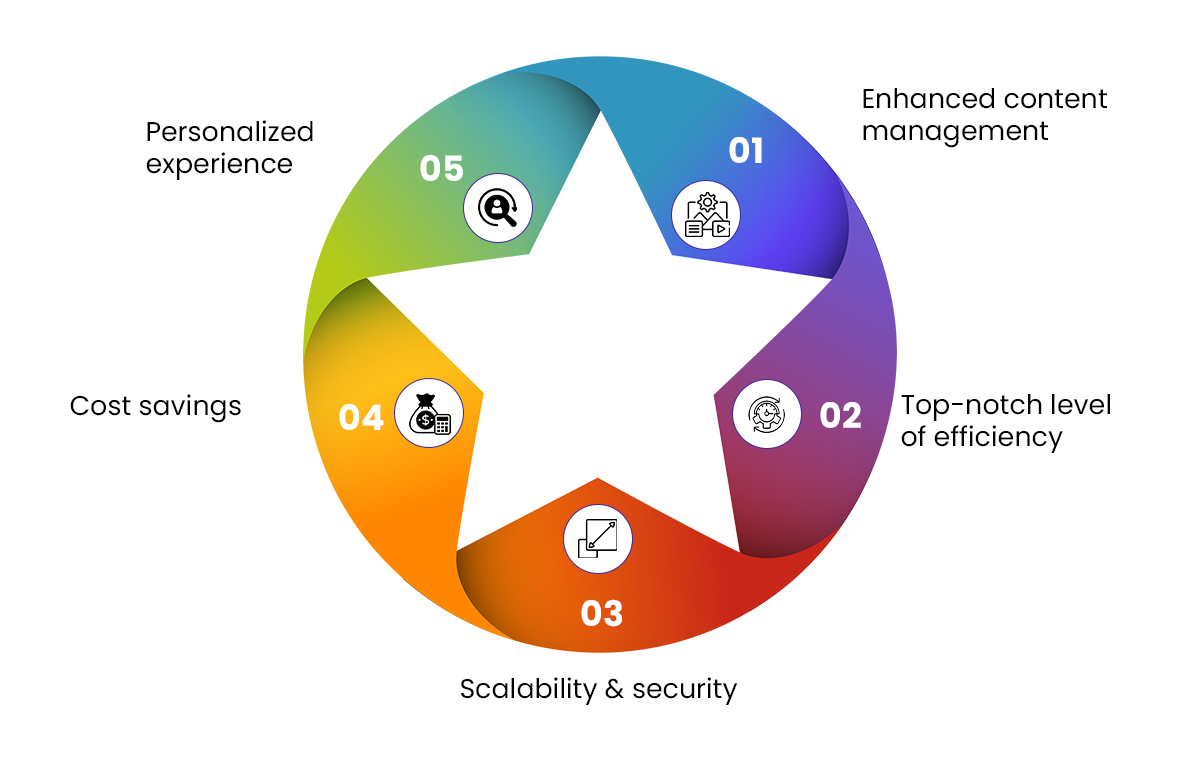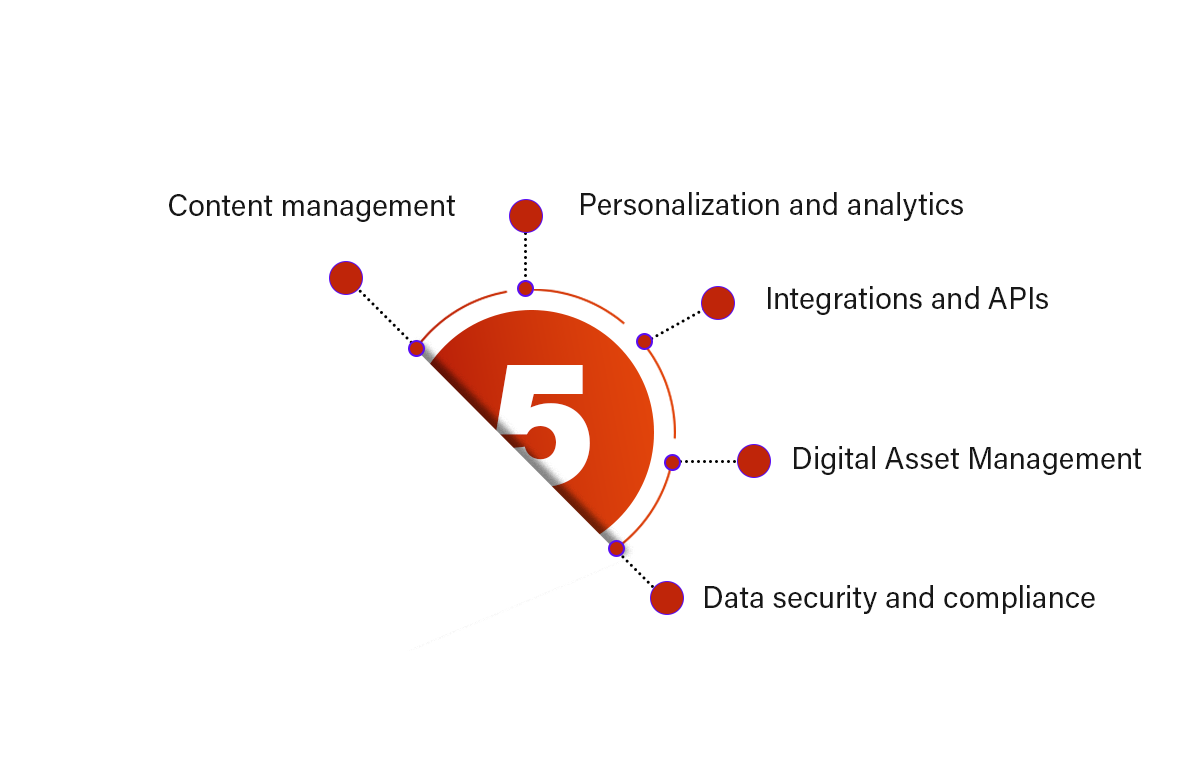Choosing a right CMS isn't just about effective features, but it's about a strategic decision that helps businesses to make their digital presence and ensure sustainable future growth.
There are many CMS available in the market, so it becomes a very difficult scenario to choose the right one for your business, as it directly impacts it. Today, we will look into one of the most popular CMS, Sitecore CMS. It is interesting to know that more than 117,004 websites have been using Sitecore CMS development services Worldwide. Additionally, in the enterprise category, CMS ranks the 7th most popular among 100k sites.
The popularity of Sitecore is due to its incredible features and customer-centric practices such as auto personalization, real-time insight, advanced analytics etc. Now the next question is how much the cost of Sitecore implementation is—so in this blog, we will cover every aspect of the cost related to Sitecore implementation.
Cost Breakdown of Implementing Sitecore for Enterprise CMS
From licensing to building a robust infrastructure to going for a bespoke personalized solution to ongoing support at every point in your project journey, Sitecore involves money. So here is a clear breakdown of how the Sitecore CMS implementation requires the associated cost for large-scale enterprises that handle approximately 1 million monthly visitors.
| Cost components | Estimated Cost |
| License cost (annual) | $100,000 to $200,000 |
| Design and development | $90,000 to $300,000+ |
| Cloud and hosting (annually) | $100,000+ |
| Premium add-ons (typically, five on an annual basis) | $50,000 to $110,000+ |
| Ongoing Support & maintenance (annually) | $25,000 to $120,000 |
| Non-production environments | $15,000 to $60,000 |
However, these costs are generalized estimations, and as every project needs are different and they require unique functionalities and features for their project, and depending on that, designing and development costs, premium add-ons etc.,— all costs vary in the same manner.
Critical factors and considerations for calculating the cost of the Sitecore implementation
1. Scope of the project
The Sitecore project cost will also depend on your project's business requirements, objectives, and expectations. Here are some of the technical aspects to be considered while defining the project scope—| Aspect | Description |
| Number of websites | The number of websites you want to manage or develop utilizing Sitecore. |
| Type of content | Whether it's video, text, or blogs |
| Design complexity | Feature-rich design, simple layout, or a creative one. |
| Integration | Sitecore integration with payment apps, CRM, or email platform. |
| Personalization | Displaying content according to the user behavior. |
| Multi-language support | It is also important to analyze whether your business requires multi-language support or not. |
| Hosting type | Whether your site is being hosted on other servers or in the cloud |
2. Evaluation and Planning
First, you require to keenly understand your organization's needs and requirements, along with your budget, and based on that, you can go ahead with your implementation process.
3. Infrastructure Cost
Another factor that is responsible for increasing your cost is infrastructure. You need to analyze whether you need to build an infrastructure that can manage and host your Sitecore or if your existing infrastructure just needs some modification and enhancement.
4. Agency Support/Partner Cost
Once you are done with the Sitecore implementation, the next step is the ongoing maintenance and support. The cost depends very much on whether you are going to hire a freelancer, make an in-house team, or hire a Sitecore development company.
5. Redesign or Re-platform Cost
It is one of the other factors that contribute to the cost, as you want to redesign or re-platform. When it comes to redesign, in which you only revamp your site so that you can give a better user experience to the visitors, while on the other hand, a re-platform means you are shifting all your templates, modules, and content to a new CMS. Redesign can expand your project timeline, while on the other hand, re-platforming to another CMS takes less time.
6. Number of Websites
When you are implementing the Sitecore CMS and if you have a medium-sized business that consists of one or two websites, then your cost doesn't increase heavily. But, if you have a big enterprise global brand that has more than 50 sites and targets multiple languages and regions, then the cost will be significantly higher.
7. Content Migration
If you have a large chunk of content assets that you want to migrate, then you have to invest more money and time; on the other hand, companies with a few 1000+ content assets will expect less cost as the content can be stored in their database.
8. Training
If your in-house team is using simple platforms, such as WordPress, but when it comes to using Sitecore, it is a bit complex as it is built on a .NET architecture, so your developers might need training. If your development agency also trains your in-house team, then your implementation cost will increase to some extent.
9. Third-party Integrations
Whether you want to integrate some third-party platforms or systems, such as marketing automation tools, ERP, CRM, etc., this will incur additional costs for the site's core implementation.
10. Licensing Cost
The licensing cost, which can fluctuate depending on a variety of factors that you are going to utilize, such as:
- Website traffic
- Chosen modules
- Quantity of users
- Add-on modules
- Non-production installations
- Number of web servers or content editors
11. Licensing Model
It depends on what kind of subscription approach you are going to opt for, which will help you meet your business needs and give you advanced features and capabilities.
| Subscription Plan | Visits Per Year |
|---|---|
| Standard | 2M |
| Corporate | 12M |
| Enterprise | 240M |
12. Ongoing Maintenance and Support
Once you are done with the Sitecore implementation, the next ongoing expense will be maintenance and support. It may be anything from bug fixes to software upgrades, to provide training to the team.
The integral benefits of using Sitecore CMS services
Sitecore offers a large suite of core benefits such as top-level security, easy management of content across all multiple channels, personalized experiences and more. Let’s dive into some of the Sitecore CMS benefits—

Enhanced content management
When it comes to the Sitecore content management for large enterprises, it offers a great suite of incredible tools that can effectively manage, curate, and publish content on multiple channels. Not only this, but it can also help organizations to get all their digital assets on a unified and centralized platform that can easily store, manage, update, and retrieve their digital assets.
Top-notch level of efficiency
Using the Sitecore CMS for enterprises can efficiently automate the repetitive processes of curating and organizing content for mobile devices, websites, and intranet. In this way, organizations can give their 100% attention to other tasks, such as customer service or marketing their products/services, instead of getting themselves in the loop of doing technical aspects related to web publishing.
Scalability and security
One of the core benefits of Sitecore is that it provides a secure and robust environment where you can easily expand without worrying about affecting performance and security practices.
Cost savings
As all the processes of streamlining and repetitive tasks have been automated, the workforce can save a lot of time, which in turn provides substantial cost savings.
Personalized experience
It comes with unparalleled personalization features that help website visitors to get an immersive experience by offering them what they actually need.
Who can benefit from Sitecore implementation?
A variety of businesses are benefiting from Sitecore implementation, and here are some of the industries that are well-suited for Sitecore implementation—
- Enterprise-level organizations can incredibly benefit from Sitecore, which meets their complex digital needs and provides better handling of multiple websites.
- B2B and B2C industries, such as healthcare, technology, financial, and retail, can effectively take advantage of the Sitecore platform.
- As it can provide the best-of-its-kind results when it comes to managing multi-site and multi-language capabilities, Sitecore is one of the prominent choices for global businesses.
- Content-heavy organizations, including educational institutions and media companies, benefit from Sitecore’s intuitive features and benefits.

Comprehensive features of the Sitecore enterprise CMS
Here are some of the incredible features that help mid-sized and large enterprises to manage and publish their content:

- ✔ Content management
It brings the most viable content management abilities for mid-sized and large enterprises. This helps them for curating, managing, and deploying the content all over diverse digital channels. Not only this, but it also helps users to give the experience of personalized content by showing the website's content according to the user's preferred language and region. - ✔ Personalization and analytics
As it comes with top-level advanced personalization features, which help users get a top-notch personalized experience by collecting data based on their preferences. Also, it can effectively track the campaigns by measuring engagement metrics such as unique visits, page views, etc., with the help of Adobe Analytics/ Google Analytics. - ✔ Integrations and APIs
To expand the Sitecore prominent functionalities, Sitecore can be integrated with third-party services such as ERP CRMs and payment gateways, which provide more flexibility and comfort to the users by improving the experience of the website. - ✔ Digital Asset Management
It becomes extremely convenient when the Sitecore CMS is integrated with other digital asset management because it ensures the seamless flow of all digital assets such as audio files, videos, and all types of images. Also, marketers can easily find out the assets they require for a particular process in a short span of time. - ✔ Data security and compliance
By utilizing third-party solutions, you can effectively provide an additional level of airtight security. It includes advanced monitoring tools and two-factor authentication so that it can detect malicious activities. Also, Sitecore comes with role-based access control capabilities that only allow the administrators to provide the restricted user access to sensitive information and data. It is also important to ensure that your site is kept intact with all the available updates so that you can protect your website from vulnerabilities.
Frequently Asked Questions
1. What is the actual cost when it comes to Sitecore implementation?
Sitecore implementation cost highly depends on the magnitude of factors, especially for enterprises. In general, the licensing cost starts from $60k to $80k/year, widely based on the project scope, features, and scalability. In the case of mid-size projects, the implementation cost of Sitecore is between $140k and $320k. If you choose the enterprise or large projects, the cost will be higher. Also, you need to add the other costs, such as infrastructure costs, cloud hosting, and regular maintenance. However, the Sitecore in duo with CMS is a bit expensive, but it is worth it as it delivers a strong return on investment (ROI).
2. Does the Sitecore provide E-Commerce stores with multi-language support?
Sitecore provides multi-language support that can help structure content in a convenient language while also focusing on managing translations and formatting with respect to localization. With the help of multi-language support, it is really beneficial for global brands to provide a localized shopping experience that can make their brand stand out in the crowd.
3. Is it a good option to choose Sitecore development for my project?
Yes, it is good if you choose Sitecore development for your project, as it is an extremely powerful and incredibly versatile platform that is utilized to make large-scale websites. These websites not only come with powerful features but also provide exceptional scalability and extensive capabilities.
.jpg?lang=en-US&ext=.jpg)

.webp?lang=en-US&ext=.webp)

.webp?lang=en-US&ext=.webp)

